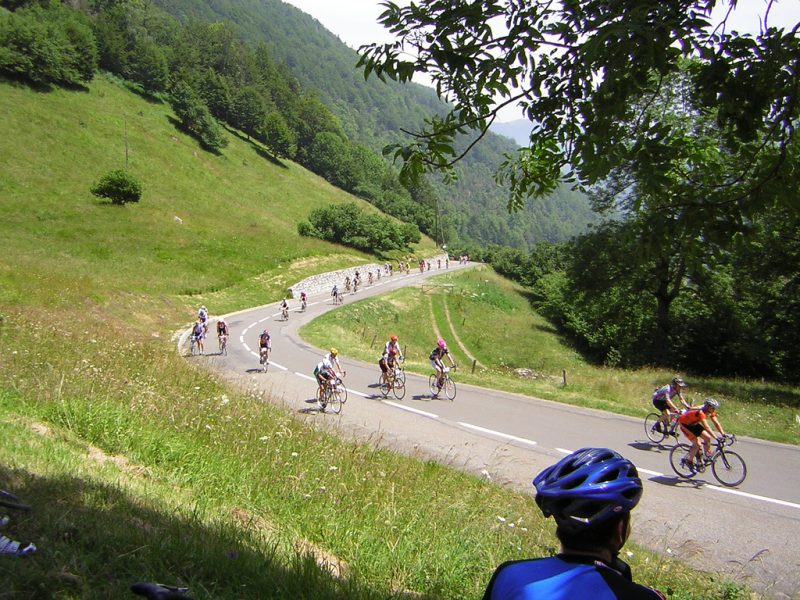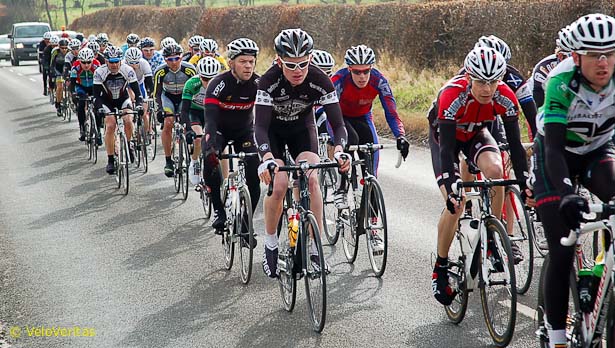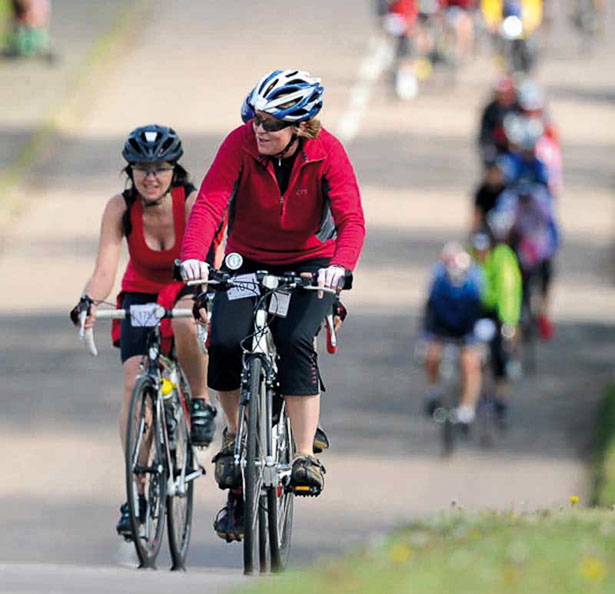We look at the popularity of Sportives in this article. In 2014, both the Tour de France and the Giro d’Italia will visit the UK. The 2011 World Road Race Champion was a British rider and the current Tour de France champion is British also.
You’d be forgiven for thinking that participation in UK road racing would be booming. But it isn’t.
The number of road races in the UK increased last year by 5% according to British Cycling. This might sound like a success story but consider that attendance at cyclocross races went up 30% and the number of sportives apparently rose by 57% in the same time period. Also the number of Premier Calendar (top level domestic) road races has slumped to just six events in 2013.
Entry-level road racing is failing to fully capitalise on the upturn in cycling and the top level of domestic road racing is in decline.
– Submitted by David Hamill –
* * *
Life outside of the medal factory
The domestic road racing appears to have little place in the Olympic medal factory created by British Cycling. The top level domestic road scene isn’t important because the talent is identified at an early age and then developed on the track before being sent abroad to race on the road. Domestic road racing doesn’t figure much here and I believe it is being largely ignored by the governing body when you consider the meticulous organisation and funding put into winning medals and grand tours. This is because it’s not a factor that anyone at the top level will lose their job over so nobody is motivated enough to care.
What seems to have been forgotten is the very reason for spending all of that money trying to win medals in the first place. It’s to have a sporty and therefore healthier public who then take up less public resources being ill. Inspiring people is only the spark. They also need something to do with their inspiration. Just now the destination for those inspired to ride a bike is a sportive ride and this is causing problems for a system that was established when sportives didn’t exist.

* * *
Sportives give newcomers a target
The market for sportives has been the main benefactor of the massive uptake in road cycling. When someone takes up cycling, having a target gives them the required focus to get the miles in and maybe lose a bit of weight if they are carrying a bit of timber. Without sportives to ride, many people would give up cycling within a few years or would not be as fit as they are. There’s no arguing that they have been a positive introduction to the sport. But there’s also a bit of an identity crisis thing going on here.
The rest of this article may seem like an attack on sportives. It’s not meant to be. Instead I’m arguing for a clearer divide to be drawn between sportives and road racing.
* * *
Riding against the course
When you ride a sportive you’re riding against the course, it is meant to be difficult, a stretch of your ability.
The idea of ‘getting a time’ is something that I’ve always struggled to understand (it’s rarely your time) but let’s park my cynicism about this just now.
My problem with many of the sportives on the UK calendar is that they are deliberately designed to be easy enough to get a big field of entries and therefore aren’t very challenging for many of the people riding them. So what happens is many of the riders behave as though they were in a race.
This identity crisis extends beyond the weekend when they tell their workmates about their racing antics on the Monday morning. The cycling press helps sustains this lie in the way it writes about the subject.
* * *
Preserving the lie
If you knew nothing about sportives or bike racing in the UK and picked up a road cycling magazine you would probably come to the conclusion that professional cyclists do road racing and amateurs do sportives. This is what the magazine tells you to think. It doesn’t matter which one, they all do it and they do this because there’s money in it.
So how can we expect people to discover amateur road racing when much of the cycling press acts as though it doesn’t exist?

There is a vicious circle here.
The cycling press are writing about sportives as though they are races because that’s what many of their readers want to believe. As a result newcomers reading their magazines are led to believe sportive riding is racing.
For example an article teaching the reader how to attack their group in a sportive is typical of the type of journalism that doesn’t really help the sport. Articles about sportive riding are often full of words like competitors, breakaway, race and attacking.
Meanwhile real racing is taking place largely unreported – unless it’s at a professional level. I believe it’s time that changed. The cycling press needs to take responsibility for the way it presents the sport rather than simply reporting on the effects of what it has helped to create.
* * *
What’s all this about Rhododendrons?
Bear with me here, it’s going to get a bit bizarre.
The system that makes road racing happen is provided mainly by the cycling clubs. They organise races for the mutual benefit of the road racing community. They don’t do it to make money and they rely on unpaid volunteers to make their races happen. In turn these people attend races organised by others who do the same.
Back in the day when you got into cycling you joined a club and they kept you on the straight and narrow. Racing is what the fast guys did and if you were fast enough you’d be guided in the black art of entering a bike race (It’s still quite black unfortunately).
This little culture is like UK flora before someone decided to plant a rhododendron in the countryside. It was balanced. There was an established way of doing things that worked. But like rhododendrons, the system that is in place isn’t equipped to deal with a foreign body that is flourishing in the space it inhabits.
The sportive market is commercial so it is more aggressive and customer-focused than road racing which exists on the principal of mutual benefit and reciprocation.
The impact of this is three-fold.
Firstly amateur road racing is being largely overlooked in place of more accessible sportives.
The sportivists who then discover and move on to road racing may be fast enough to race but have often not been ‘brought up’ in the system that has existed to ensure riders are safe.
Lastly, the sportivists may approach race entry in the same way they did sportives. Their expectations surrounding the level of organisation can often go unmet, much to both their annoyance and that of the race organisers.
The system wasn’t created to account for the presence of sportives and the number of new riders who come through this route. It isn’t equipped to deal with the new environment that exists.
We are already seeing long-standing road races being cancelled because a sportive appears on the same day on the same roads. The system for avoiding road races clashes was never designed to account for sportives appearing without warning and is helpless to do anything about it.
* * *
And what about Sunday shopping?
When the Shopping Act 1950 was created it outlawed Sunday shopping in England and Wales. An equivalent was never created for Scotland. This was not because the Scots wanted to allow Sunday shopping but because attitudes in 1950’s Scotland were so Presbyterian that the very notion of opening a shop on Sunday was ludicrous. There was simply no need to write it into law.
As times and attitudes changed there was no law to prevent people shopping in Scotland on a Sunday so it enjoyed Sunday opening long before England and Wales got round to changing their laws.
In years gone by it was practically impossible to get into road racing without being a member of a cycling club which was fine because most people who cycled quite fast were members of one. There was no need to create a rule surrounding required levels of competence before racing.
Now it’s perfectly possible to enter a road race having never been anywhere near a fast moving bunch which means there is no ‘apprenticeship’ in bunch riding to go through that helps make sure you race safely. I believe something needs to be done to fill that gap.
If road racing were invented today the system set up would likely take into account the various paths in which people can take in discovering road racing. There is no longer just the one.

About David Hamill
David Hamill is a freelance usability specialist (he helps people make stuff easy to use) based in Scotland and is a mediocre (at best) bike racer [his words!]. He organises the “Dig in at the Dock” cyclocross race in Bo’ness and helps promote the Rothesay Weekend cycle races in September. He created a YouTube series of dubious quality showcasing the Scottish cyclocross scene and often talks about how he’s going to make an easy-to understand online guide about getting into road racing. But so far it’s just talk.



